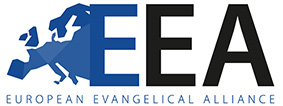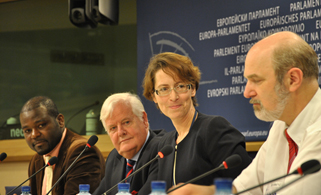We are talking with Auke Minnema, general director of the European Christian Political Movement (ECPM). The ECPM is a political party that wants to unite all Christian politicians in Europe. Auke is married with one daughter and lives in Antwerp, Belgium.
Auke worked in the European Parliament as the assistant to a Member of the European Parliament (MEP) for four years before he joined the ECPM.
Where do you find Christians in the European Parliament?
Most Christians will be found in the centre or centre-right, but during my work in the European Parliament I have met with Christians in almost all political groups in the Parliament. Some MEPs are very vocal about their religion, others are more private about it. You will find them among the conservatives on the right but also among the socialists on the left and everything in between. We all agree on the basic principles of the Christian faith, but our political priorities can differ widely. And that’s okay. We occasionally have big discussions about our political programmes but when that’s done, we take a step back and still recognise each other as brothers and sisters.
Was faith a motivation for you to enter politics?
I have always been interested in politics and I have been on the crossroads between church and politics for a while but eventually landed in politics. God gave us the world but also a mandate to take care of it. That could be close to home, taking care of your neighbour, taking care of the planet, but also by engaging politics. Through politics we can shape our societies so that they are good for everyone.
Quite a few of our readers will associate politics with getting one’s hands dirty. Would you agree?
The American theologian and political activist Jim Wallis once said: “Every budget is a moral document.” Why are we spending such an amount on health care to the detriment of our spending on education or stimulating the economy, and vice-versa? These are hard choices and you can never satisfy everyone. Politics is hardly ever about black and white. There are many shades of grey in between. Sometimes you have to swallow a melon to make some progress on another topic. That can be painful, but politicians should always be able to explain why they felt that compromise was necessary. What did they get in return?
Are there specific Christian topics?
Of course, there are. Just think of medical ethical topics, persecution of Christians, Freedom of Expression etc. But I believe there is a need for Christians dealing with the economy, defence strategy, agriculture as well. Too often, we just feed stereotypes. But that’s true for Christian voters as well. Some Christians have quite limited political agendas as well such as euthanasia and abortion. We should be realistic. Under the current political conditions, we’ll never be able to stop these practices. But every little step into the right direction is still a step into the right direction. That’s how politics work. It is usually a long-term effort. And over time, many little steps might change the consensus on a topic. Forty years ago, same-sex marriage was unthinkable. Today, repealing same-sex marriage is unthinkable. In the ninety’s, prostitution was widely accepted as a business, but public opinion is slowly changing, and the so called Nordic model is gaining support.
In the European Parliament, you have different worldviews coming together. How does that work in practice?
The liberal worldview is very popular in this European Parliament, but the populistic worldview is rising. That’s the world we live in and we just have to find ways to deal with that. And usually politicians do, even on topics where positions are miles apart. Where it gets really difficult is where people are of the opinion that there is no place for religion in the political arena all together. People who consider that religion is something you do at home but not in the Parliament. They don’t understand or accept that our faith is part of our identity just like their secular worldview is part of theirs. That is really difficult to handle as they basically deny your identity in politics.
Does that often happen?
It does not happen that often, but it happens. When I was an assistant to an MEP, my boss once had such a clash with a colleague who really felt that there was no place for religion in politics. That was hard. But after the debate, my MEP invited this colleague for a cup of coffee and a more personal conversation. They both could explain where they were coming from and make a connection. That worked really well. The have had their political clashes afterwards but it never became personal again. That’s quite an effort but I believe that Jesus would have done the same. Jesus put relations first and so should we.
Do you have any advice for Christian organisations engaging politics?
As I said before, politics is a lot about different shades of grey and small steps. So, Christian organisations should take a realistic approach. Your concern is just one topic among the many and there is only so much a politician can handle. Therefore, be concise, and time your message well. Even more so when you are engaging non-Christian MEPs. Your deeds, your attitude, can make the difference!












